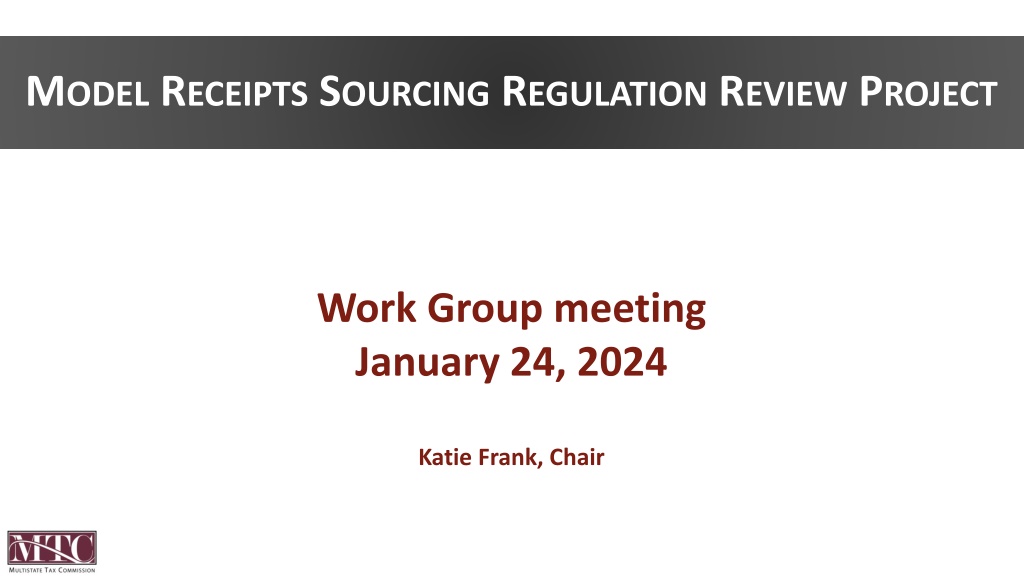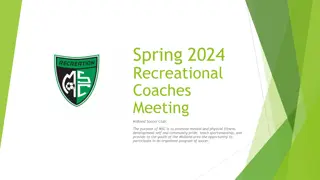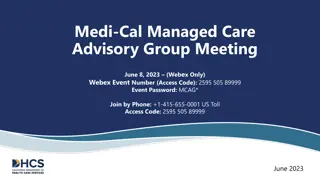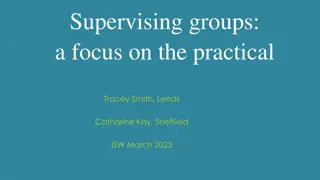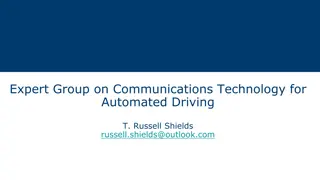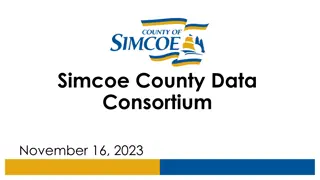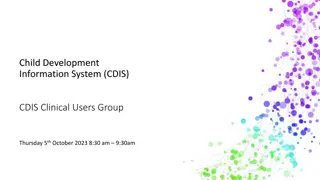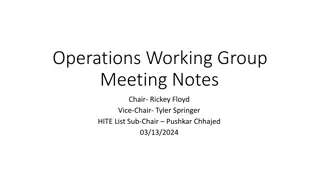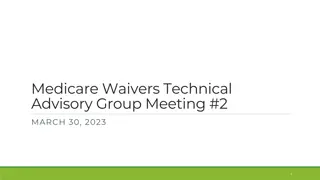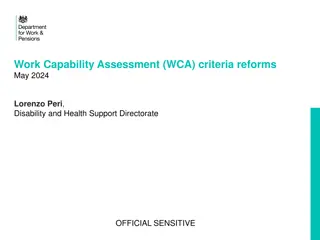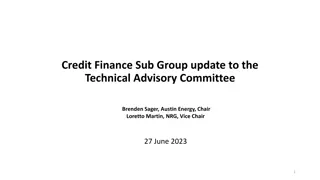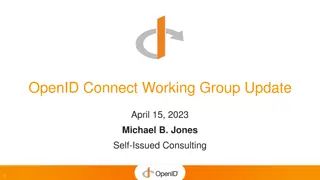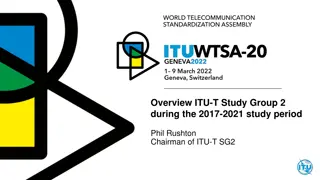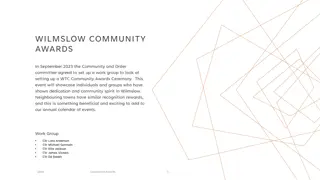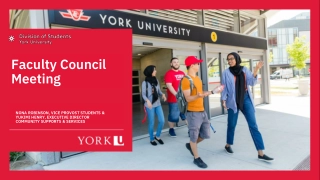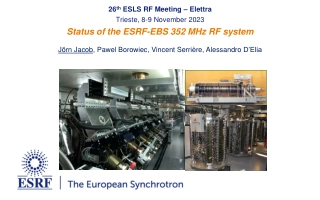Work Group meeting
This review project aims to assess the need for a special industry rule for trucking companies given the shift to market-based sourcing by the MTC. Factors prompting the review include distortion in applying the mileage approach, differences in revenue per mile among states, and the nature of taxpayer business activities. Key terms and a case study on UPS highlight the complexities of sourcing rules for trucking companies.
Download Presentation
Please find below an Image/Link to download the presentation.
The content on the website is provided AS IS for your information and personal use only. It may not be sold, licensed, or shared on other websites without obtaining consent from the author. Download presentation by click this link. If you encounter any issues during the download, it is possible that the publisher has removed the file from their server.
Presentation Transcript
MODEL RECEIPTS SOURCING REGULATION REVIEW PROJECT Work Group meeting January 24, 2024 Katie Frank, Chair
Trucking Companies special industry model rule
Why Review the Trucking Rule? At least three factors have motivated this review: The MTC adopted the special industry rule for trucking companies when UDITPA utilized cost of performance to source services. With the MTC s adoption of market-based sourcing, the question is raised whether there is a need for a special industry rule, whether the rule comports with the MTC s current approach to sourcing receipts, and whether the general rule fails to fairly represent the extent of the taxpayer's business activity. Published decisions in Montana and New Mexico have held that applying the mileage approach to UPS resulted in distortion: Montana Dep t of Revenue v. United Parcel Service, Inc., 830 P.2d 1259 (1992) New Mexico Public Dec. No. 19-27 (In the Matter of the Protest of United Parcel Service Inc.), affirmed, N.M. Ct. of Appeals, No. A-1-CA-385855 Not all companies that provide trucking services are subject to the same sourcing methodology. 3
Key Terms of the Trucking Company Rule Reg. IV.18(g)(1). In General. As used in this regulation, the term "trucking company" means a motor common carrier, a motor contract carrier, or an express carrier which primarily transports tangible personal property of others by motor vehicle for compensation. . . Reg. IV.18(g)(3)(iv)B. Numerator of the Sales (Revenue) Factor From Freight, Mail, and Express. The total revenue of the taxpayer attributable to this state during the income year from hauling freight, mail, and express shall be: 1. Intrastate: All receipts from any shipment which both originates and terminates within this state; and, 2. Interstate: That portion of the receipts from movements or shipments passing through, into, or out of this state as determined by the ratio which the mobile property miles traveled by such movements or shipments in this state bear to the total mobile property miles traveled by movements or shipments from points of origin to destination. 4
Montana Dept of Revenue v. United Parcel Service, Inc., 830 P.2d 1259 (1992) Facts: Taxpayer specializes in nationwide small package pick-up and delivery service. Charge per package based on (1) weight ,( 2) the rate zone to which each package is sent, and (3) a package service charge. US divided into operating area with each having an operating center where initial and final package sorting takes place. Packages destined for other operating areas are delivered to hubs, which are larger sorting centers. Due to taxpayer s specific operating method, vehicle miles may be different from the distance between origin and destination. Finding: [S]ales factor must be based on the revenue received by the taxpayer. Evidence . . . revealed that UPS drivers in Montana drive more miles to deliver fewer packages than drivers in any other state, and that average revenue per mile varies substantially from state to state. Further, [State Tax Appeal Board] found that expert testimony presented by UPS revealed the underlying differences between UPS and other freight carriers, and that the mileage method for calculating revenue was less precise for UPS.
New Mexico Public Dec. No. 19-27 (In the Matter of the Protest of United Parcel Service Inc.) UPS argued it was not a trucking company under the special trucking rules since it did not primarily transport property by motor vehicle, but instead was a package delivery company. UPS pointed to only 13% of its activities by time involved motor vehicle transport compared to 87% of time involving other activities involving hub and sorting; loading/unloading; carrying of packages; using of electronic devices. Hearing Officer rejected UPS s argument and found transport of packages from origin to destination was predominant source of income generation. Hearing Officer concluded that UPS was an express carrier based on federal law, such that it fell under trucking company special rules.
New Mexico Public Dec. No. 19-27 (In the Matter of the Protest of United Parcel Service Inc Finding of distortion requiring equitable relief: Taxpayer's actual New Mexico revenue numbers in 2007, 2008, and 2009 in comparison to the apportioned income under the special trucking method shows that the special trucking method substantially distorts Taxpayer's actual New Mexico revenue and business activity. As the Montana Supreme Court found, relying on mileage to determine the sales factor of apportionment can significantly distort the extent of Taxpayer's activities in a low population, large geographic state. And like Montana Supreme Court similarly concluded, the evidence presented in this case illustrates how the application of the mileage method distorts the extent of Taxpayer's business activities in New Mexico.
Possible approaches that were considered by the work group- The work group initially considered whether: 1) to retain the mileage approach; or 2) to propose an approach that looks to the place of pickups and/or deliveries. The work group discussed the pros and cons of each approach. 8
Mileage Approach Pros Cons Most states currently use some form of the mileage approach. Does not reflect the taxpayer s market in a general sense. Does not reflect the many aspects of modern logistics. Appears to be a workable approach. Some work group members suggested that the mileage approach reflects where the service is delivered (but others disagreed). Differs from the sourcing rule that applies to air transportation and from the rule that applies to ground transportation provided by companies that do not fall under the definition of trucking company. Takes into account that length of trip may in some cases be a major component of the service that is provided. Possible legal problems (see Montana and New Mexico decisions finding that the mileage approach created distortion in the case of UPS). 9
Delivery Approach Pros Cons Reflects where the service is delivered, which is the general approach that the MTC has taken to the sourcing of services. Would require a shift by most states in order to achieve uniformity. Avoids the legal problems identified in Montana and New Mexico decisions. Requires many businesses to change their current reporting and record-keeping for taxes. Does not take into account that length of a trip may be a major component of the service which is provided. Comports with the way that many states source air transportation. As states begin to transition to a delivery approach, there may be multiple taxation. Reflects the taxpayer s market in a general sense 10
Work Group Deliberations Members of the work group divided on whether the current mileage approach was or was not a market-based approach. Some members of the work group suggested that the work group consider a two-factor rule, applying both the mileage approach and the pickup/delivery approach. The work group also discussed whether to retain the special industry rule for trucking companies (mileage) but to exclude from the definition of trucking company express companies/package delivery companies such as UPS and similar companies. 11
Another idea proposed During the course of these discussions, an alternative idea was suggested - Authorize trucking companies to elect whether to apply the mileage approach or the pickup/delivery approach BUT Require each company to apply that election in all states in which it operates. 12
Work group Deliberations The work group s deliberations also raised the question of whether the MTC should move away from some industry specific rules and instead address major revenue streams within the 17 market-based sourcing regulations: In the modern economy, it is often difficult to define an industry Multiple industries may engage in similar activities Individual businesses may engage in vastly disparate activities. 13
Work Group Deliberations An informal poll was taken in April to assess the pulse of the work group with respect to whether the trucking company rule should be withdrawn or modified and if so how. Members from eight states participated in the poll (including abstentions). A plurality of voters indicated that the current mileage rule should be maintained but there was no clear consensus. Subsequently, some work group participants expressed an interest in continuing to explore possible alternatives to the current trucking company rule. 14
Convening of the transportation services study group MTC staff convened a study group on transportation services. The study group s purpose was to assist staff in identifying issues relating to the sourcing of transportation receipts and gather information that may be of value to the work group. The study group consists of 11 volunteers, coming from both states and industry. The call for volunteers was sent to all persons on MTC s Uniformity Committee, Litigation Committee, and Public mailing lists The study group is not a decision-making body. It was understood by all that participants do not speak on behalf of their employer (unless they indicated otherwise). 15
Study group volunteers Jon Almeras Airlines for America Laurie McElhatton California Franchise Tax Board Nikki Dobay Greenberg Traurig LLP Valerie Newsom Utah Tax Commission Michael Fatale Massachusetts Department of Revenue Eric Tresh Eversheds Sutherland Katie Frank California Franchise Tax Board Jennifer Young Moss Adams Michael Hale Kansas Department of Revenue Teresa Zetwick Hawaii Department of Revenue Victoria Johnson Oregon Department of Revenue 16
Study group discussions General focus of the study group s discussions: Implications of moving from the mileage approach to a pickups/deliveries approach for some or all ground transportation services. Possibly shifting from sourcing approaches determined by the type of transportation company providing the services (e.g., trucking company or railroad) to approaches determined by the type of service provided regardless of the type of company. Key Takeaways (see MTC staff memo dated 1/19/24 for more details, which can be found on the Regs Review project page) 17
Study group discussions Mileage approach and its alignment with the market-based sourcing approach. Uniformity and misapplication of the current rules. Ease of administration of trucking sourcing rules. Sourcing of receipts of non-trucking companies that engage in similar activities. Sourcing of receipts of trucking companies, such as express carriers and others that engage in similar activities. Potential effect (or lack thereof) in the number of sales sourced to the states upon a change in sourcing rules. 18
INVITATIONTOTAXADMINISTRATORS, TAXPAYERSAND INDUSTRYREPRESENTATIVES: Your input is invaluable to ensure a thorough review of the issues. Please consider attending future work group meetings and providing your thoughts on the matters reviewed. Improve taxpayer guidance by suggesting topics for consideration by the model regs review work group . . . at this meeting, and/or at work group meetings, and/or reach out to: Brian Hamer, MTC Counsel, at bhamer@mtc.gov Helen Hecht, MTC Uniformity Counsel, at hhecht@mtc.gov 19
Consider becoming a regular work group participant Anyone can give input to the work group. 12 states have regular work group participants who agree to follow the project and: Review information on the issues discussed; Provide state information and their own experience and opinions; Participate in any deliberations and decisions on recommendations to the uniformity committee including voting on issues. Giving input or participating in work group decisions does not mean that you are expressing your state s official position on an issue. 20
Other Business Next meeting
